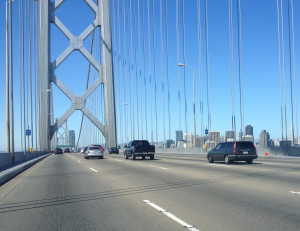More Facts About Comparative Negligence
Earlier this week, we defined comparative negligence and explained, in general terms, that comparative negligence can reduce a plaintiff’s recoverable damages by an amount proportionate to the plaintiff’s negligent “fault” in the incident that caused the injury or damage.
Today, we’re taking a look at some more specific rules which govern comparative negligence in California.

COMPARATIVE NEGLIGENCE CAN APPLY IN NUISANCE ACTIONS
A plaintiff’s negligence can reduce recoverable damages for personal injuries and property damage in claims based on private nuisance. For example, where a plaintiff claims damages resulting from a view interference, but the plaintiff allows the interference to be built, or waits for a significant amount of time before complaining or pursuing abatement of the interference, a court may decide to reduce the plaintiff’s damages by an amount that reflects the plaintiff’s comparative “fault.”
Note: comparative negligence isn’t always a factor in nuisance suits. Hiring an experienced attorney can help ensure that your individual claims and defenses are properly evaluated and addressed.
COMPARATIVE NEGLIGENCE CAN APPLY EVEN WHEN THE PLAINTIFF’S NEGLIGENCE WAS NOT NECESSARILY IN THE DIRECT CHAIN OF CAUSATION
Comparative negligence becomes an issue when a plaintiff’s conduct:
1. Contributes directly to the injury, as a (partial) actual or proximate cause; or
2. Contributes to the extent or severity of the injury, even if the plaintiff’s act or omission was not a proximate cause of the injury.
The key is proving that the plaintiff acted negligently in a way that increased or impacted the resulting damages or harm. The negligence may be causally linked to the injuries suffered, or unrelated, but it generally must be either contemporaneous with the defendant’s wrongdoing or occurring after the defendant’s wrongdoing but within a window of time that makes it reasonable to conclude that the plaintiff’s negligent actions contributed to the injury resulting from that same event or incident.

COMPARATIVE NEGLIGENCE MAY APPLY IN STRICT LIABILITY CASES AND CASES BASED ON STATUTORY VIOLATIONS
“Strict liability” is a legal theory that holds a defendant responsible for injuries to a plaintiff, even without proof of negligence, because the defendant engaged in certain kinds of dangerous conduct or produced an inherently dangerous product. Strict liability often applies in products liability cases, where a manufacturer creates an item that is dangerous, either by design or as a result of a manufacturing defect (and, in some cases, both).
Comparative negligence may apply to damages in strict liability cases, if the plaintiff’s negligent conduct contributed to the injury.
In addition, comparative negligence may apply in cases where the plaintiff’s injury resulted from the defendant’s violation of a statute to which negligence rules (or analogous rules) apply.
Comparative negligence rules are complicated; understanding and applying them properly requires the assistance of an experienced legal counsel. Do not try to evaluate your own legal rights in negligence or personal injury cases without consulting an experienced attorney.
***
DISCLAIMER: This article is intended for informational purposes only, does not constitute legal advice to any person or entity, and does not create an attorney-client relationship with any person or entity. Personal injury law, including negligence, is a complex legal topic, and no single article can provide complete or comprehensive coverage or information about this or any other legal topic or issue. Your personal liability may differ, based on your individual facts and circumstances. If you believe you have a legal claim or issue, or wish to know more about your individual rights, consult an experienced attorney without delay.














